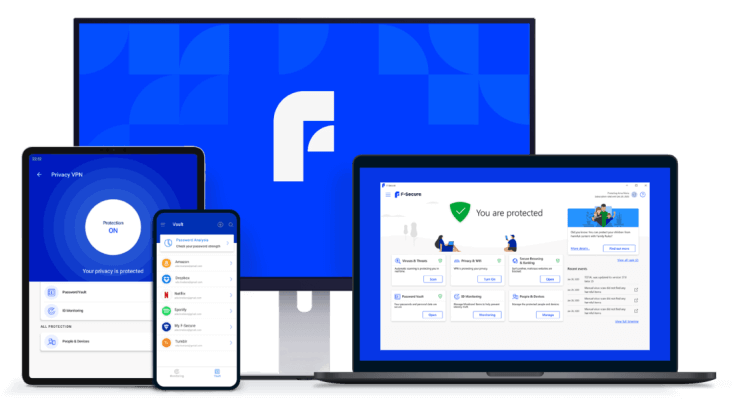- Products
- Renew
- Articles
- Support
- Free tools
- F-Secure Text Message CheckerCheck with AI if a text message is a scam
- F‑Secure Online Shopping CheckerCheck for free if a website is safe to buy from
- F‑Secure Identity Theft CheckerCheck if your personal information has been part of a data breach
- F‑Secure Strong Password GeneratorCreate strong passwords for free
- F‑Secure IP CheckerCheck your IP address and location
- F‑Secure Online ScannerScan and clean your PC for free
- F‑Secure Router CheckerIs your internet connection safe?
- View all free tools
- Scam protection
- My F‑Secure
10 must-know tips for safe online shopping
By following these safe online shopping tips you can take the stress out of purchasing goods and services online, and focus on the important thing: buying cool stuff.

Over the last two decades ecommerce has transformed the world of retail, developing from a niche sector into a five trillion-dollar industry. And with so much money involved, safe online shopping has become more difficult, as cyber criminals are constantly looking for new ways to exploit those of us buying goods and services on the web.
In the US alone, consumers spent a record $9.12bn online during Black Friday in 2022, with Cyber Monday sales even higher, at $11.3bn according to Adobe, which tracks sales on retailers’ websites based on Adobe Analytics data).
This amount of money changing hands is bound to attract cyber criminals, who employ online shopping scams in a variety of ways, such as a way to install malware or steal personal details via phishing. (You can read our malware tips and details on the latest phishing scams to keep up to date on the latest cyber threats.)
However, by following our list of safe online shopping tips, you can buy online with confidence, and ensure that you stay one step ahead of the cyber scammers.
1. Look out for email scams
One the most prevalent types of shopping scam is phishing via email. These scams will usually masquerade as a well-known brand — Amazon being a favorite — and will contain a fraudulent link to an action such as confirming a delivery address, verifying your account, or updating your payment details. Click on the link and you are taken to a phishing page, where you will be asked for your details via an almost identical version of the official website.
If you receive a message like this, do not click the link in the email. And if you think it is genuine, go directly to the official website by typing the URL directly into your browser of choice.
2. Use unique and strong passwords
Safe online shopping isn’t just about avoiding scammers. Legitimate retailers can also become victims of cyber criminals, especially via a data breach, where user details are stolen. This makes it important to use a strong, unique password when creating your online identities.
Thankfully, you can create complex and unique passwords using free tools such as F‑Secure’s strong password generator. And if you want to go a step further, we also recommend using a password manager. (F‑Secure’s highly-rated ID Protection enables you to create and manage strong passwords, while also monitoring data breaches and the dark web.)
3. Enable two‑factor authentication (2FA)
To ensure the highest level of security available via a legitimate, online retailer you should enable two‑factor authentication (2FA) where available. Two‑factor authentication works by adding extra security to online accounts (beyond your username and password) requiring an extra credential, such as a one‑time passcode. By applying two kinds of identification 99.9% of automated attacks are prevented (according to 2019 research from Microsoft).
4. Use a credit card or PayPal
One of the key benefits many credit providers offer is insured payments against fraud. For example, most credit card providers have fraud protection, where they provide refunds for fraudulent transactions (which often isn’t the case for debit cards).
Also, consider using an online provider such as PayPal, which offers some support for safe online shopping. PayPal states that: If an item that you’ve bought online doesn’t arrive, or doesn’t match the seller’s description, PayPal’s Buyer Protection may reimburse you for the full amount of the item plus postage.
5. Check shopping site safety with F-Secure’s free tool
Whenever you are unsure if a webshop is safe or not, first check it for free with F-Secure Online Shopping Checker. The tool includes relevant safety information about millions of online stores across the web. It looks into things like how long a shop has been operational, how popular it is, what kind of reviews it has gotten, and tons of other technical aspects that can be tricky to spot otherwise. It’s free to use, and you’ll get a quick safety check, potentially removing the need for any other investigation.
6. Beware of big bargains
Comparison engines have essentially removed the need for retailers to provide large discounts, because these tools enable them to see what their competitors are selling the same items for in seconds (and subsequently choose to undercut them by a few percent, should they wish). So, you should look out for huge offers that seem too good to be true, because they probably are.
7. Stick with retailers you know and trust
This may seem a little tough on any new online store trying to drum up business, but with so many fake shops appearing online, we would advise you to stick with the brands that you know and trust if you want to guarantee a safe online shopping experience. But also remember that the brands you trust the most are often the ones being mimicked in the fake offers distributed via social media and email. So be vigilant.
8. Don’t shop on public Wi‑Fi (unless using a VPN)
Free Wi‑Fi can be convenient if you’re stuck somewhere without connectivity, such as an airport or conference. But you should avoid using any public Wi‑Fi for online shopping unless you have a VPN enabled, as they often lack proper encryption, making it easier for cyber criminals to intercept your data. To encrypt all your traffic and keep you safe on public Wi‑Fi, use a personal VPN such as F‑Secure VPN.
9. Check reviews
Look out for social media offers that have overwhelmingly positive reviews, as this is a traditional red flag for an inauthentic offer, as genuine products tend to have a mix of reviews. As a rule of thumb, it’s better to avoid these offers entirely. But if you feel an offer is genuine, do some extra checks, such as clicking on reviewer profiles to check that they are legitimate accounts. Also, remember to check legitimate reviews for any new shop you decide to buy from, using a respected platform such as Trustpilot (which currently features over 200m reviews).
10. Use a reliable internet security app
The best way to stay safe online is by using a trusted internet security product. With F‑Secure Total — which contains F‑Secure’s highly-rated ID Protection and Browsing Protection — your passwords are monitored, you will be alerted of breaches should they occur, and access to potentially harmful shopping sites will be automatically blocked.


Ensure safe online shopping with Total
F‑Secure’s Browsing protection (included in F‑Secure Total) enables you to evaluate the safety of shopping sites and prevents you from unintentionally accessing harmful URLs.
Quickly identify safe sites in your search results
Block scam websites automatically
Get feedback on potentially harmful sites with safety ratings

















